Jorge da Silva, professor, social scientist and assistant to president of Rio de Janeiro State University discussed the intersection of race and criminal justice, Wednesday as a lecturer of the Global Leadership Speaker Series.
Da Silva addressed business graduate and undergraduate students in T.T. Allain room 313.
Brazil, often considered culturally diverse is the complete opposite, da Silva said.
“Brazilians are encouraged to present themselves as white,” da Silva said.
Da Silva was referring to the racial whitening policy that occurred back in the late nineteenth century and early twentieth century in which was thought would better Brazil.
Da Silva said Brazil was one of the top slave importation sites during the slave trade.
“Rio de Janeiro was the part of a slave regime and during the beginning of the 20th century they were referred to as a “Black City”, ” da Silva said, “5 million slaves were sent to Brazil, and slavery lasted longer than the United States.”
Da Silva discussed the current state of Brazil from the high importation of slaves.
“50 percent of Brazil is Afro-Brazilians, yet most blacks claim they are brown,” da Silva said.
The desire not to be considered as black originates from the slave mentality, said da Silva.
“Most problems in Rio is a result of slavery,” said da Silva.
Da Silva said that there are many people incarcerated in Rio de Janeiro.
“Over 500,000 people are incarcerated, 40 percent of them are waiting to be tried,” da Silva said.
According to da Silva, the city of Rio De Janeiro has impoverished area and one of the wealthiest places in Brazil are parallel to each other.
“Rocinha, Brazil has over a 100,000 people living there impoverished next to So Conrado, one of the wealthiest places in Brazil,” da Silva said.
The justice system in Brazil reflects the racial disparities.
“Arrests resistance deaths have risen each year: 10,916 since 1999,” said da Silva.
da Silva said, the reflection in the number of murdered police officers proves the lack of a true justice system.
“1,150 police were killed between 1995-2004,” da Silva said.
da Silva inferred, all the above statistics point to slavery’s relatively recent ending, which leads to only one conclusion.
“We can conclude that race in Brazil is a problem now a days,” da Silva said.
Da Silva concluded, racism is just about on every level of field in Brazil.
“Personal Racism, and Institutional racism are major levels,” da Silva said.
Dennaire Anderson, masters in business administration student from New Orleans, said the event was informational.
“I learned that we are grateful to be able to gain knowledge, whereas other countries are limited and obsolete,” Anderson said.
Anderson described some of the information she found surprising.
“I didn’t know Brazil had slavery nearly three centuries after United States and that the majority of the country was built by slaves.
Kimberly Powell, College of Business, assistant professor of marketing said students needed da Silva’s message.
“They needed it because of growing globalization. Students need to know what’s going on globally because of a global economy,” Powell said.
Powell believed students learned a variety of new information at event.
“I would think they got a very good understanding of Brazil’s growth, that will put them in a global mindset,” Powell said.
Brazil has a population of over 200 million with 16.3 million living in the state of Rio de Janeiro.
Professor da Silva was presented with a plaque at the end of the program for making his speech at Southern University. This program was part of the Southern University and A&M College’s MBA Program’s Global Leadership Speaker Series.
Categories:
Da Silva discusses race, criminal justice in Brazil
October 18, 2012
0
More to Discover





